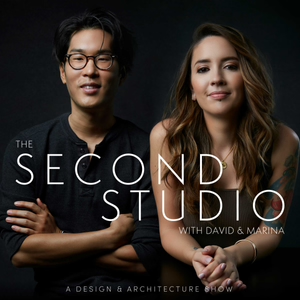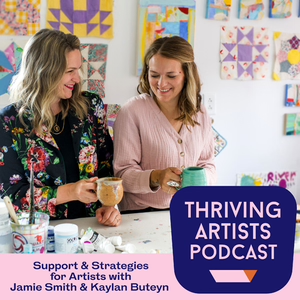
Hip Hop Philosophy, Pedagogy and Liberation
09/22/22 • 88 min
In this week’s episode of the Black Studies Podcast, we’re joined by Professor Reuben May and Dr. Dalitso Ruwe to discuss hip hop philosophy, pedagogy and liberation.
Our conversation about Black self-fashioning and collective liberation discusses Tupac, Public Enemy, Nipsey Hussle, Richard Wright, Tricia Rose, Lewis Gordon, Malcolm X, and many other artists, intellectuals and activists. In addition to our discussion about hip hop music and culture, we reflect on house music, policing, mentorship, stand-up comedy and other sites of power, contestation and desire.
Professor Reuben A. Buford May is the Florian Znaniecki Professorial Scholar and Professor of Sociology at the University of Illinois at Urbana—Champaign. He is also the author of three books: Urban Nightlife: Entertaining Race, Class, and Culture in Public Space, the award-winning book Living Through the Hoop: High School Basketball, Race, and the American Dream (2008) and Talking at Trena’s: Everyday Conversations at an African American Tavern (2001). He has been a fellow at the W.E.B. Du Bois Institute for African and African American Research at Harvard University and a Dr. Martin Luther King, Jr. visiting professor at MIT. May received his Ph.D. in sociology from the University of Chicago, and his research focuses on race and culture, urban ethnography, the sociology of sport, and the sociology of the everyday. In addition to his awards, books and other scholarly publications, May has been featured on radio and television and in print media, in particular for his performance as the #rappingprofessor Reginald S. Stuckey. He has performed at venues like Kyle Field, the Chicago House of Blues, Hard Rock Café in Seattle, as well as others in major cities.
Dr. Dalitso Ruwe holds a joint appointment as an Assistant Professor of Black Political Thought in the Philosophy Department and Black Studies Program at Queen’s University. His research interests are intellectual history of Africana philosophy, anticolonial theory, Africana legal history, Black male studies, and Black philosophies of education. His recent publications appear in APA Newsletter: The Black Experience, Theory & Event, Teachers College Record and The Blackwell Companion to Public Philosophy, Journal of Critical Race Inquiry & Canadian Journal of Continental Philosophy.
Hosted on Acast. See acast.com/privacy for more information.
In this week’s episode of the Black Studies Podcast, we’re joined by Professor Reuben May and Dr. Dalitso Ruwe to discuss hip hop philosophy, pedagogy and liberation.
Our conversation about Black self-fashioning and collective liberation discusses Tupac, Public Enemy, Nipsey Hussle, Richard Wright, Tricia Rose, Lewis Gordon, Malcolm X, and many other artists, intellectuals and activists. In addition to our discussion about hip hop music and culture, we reflect on house music, policing, mentorship, stand-up comedy and other sites of power, contestation and desire.
Professor Reuben A. Buford May is the Florian Znaniecki Professorial Scholar and Professor of Sociology at the University of Illinois at Urbana—Champaign. He is also the author of three books: Urban Nightlife: Entertaining Race, Class, and Culture in Public Space, the award-winning book Living Through the Hoop: High School Basketball, Race, and the American Dream (2008) and Talking at Trena’s: Everyday Conversations at an African American Tavern (2001). He has been a fellow at the W.E.B. Du Bois Institute for African and African American Research at Harvard University and a Dr. Martin Luther King, Jr. visiting professor at MIT. May received his Ph.D. in sociology from the University of Chicago, and his research focuses on race and culture, urban ethnography, the sociology of sport, and the sociology of the everyday. In addition to his awards, books and other scholarly publications, May has been featured on radio and television and in print media, in particular for his performance as the #rappingprofessor Reginald S. Stuckey. He has performed at venues like Kyle Field, the Chicago House of Blues, Hard Rock Café in Seattle, as well as others in major cities.
Dr. Dalitso Ruwe holds a joint appointment as an Assistant Professor of Black Political Thought in the Philosophy Department and Black Studies Program at Queen’s University. His research interests are intellectual history of Africana philosophy, anticolonial theory, Africana legal history, Black male studies, and Black philosophies of education. His recent publications appear in APA Newsletter: The Black Experience, Theory & Event, Teachers College Record and The Blackwell Companion to Public Philosophy, Journal of Critical Race Inquiry & Canadian Journal of Continental Philosophy.
Hosted on Acast. See acast.com/privacy for more information.
Previous Episode

Blackness and Belonging
In the first episode of the Black Studies Podcast, we are joined by Dr. Debra Thompson and Tari Ajadi to discuss creative and collaborative work on Blackness, belonging and the search for promising and fantastic futures.
Dr. Debra Thompson is the Canada Research Chair in Racial Inequality in Democratic Societies at McGill University and a leading scholar of the comparative politics of race. Deb's teaching and research interests focus on the relationships among race, the state, and inequality in democratic societies. She has taught at the University of Oregon, Northwestern University, Ohio University, and held a SSHRC postdoctoral fellowship with the Center for American Political Studies at Harvard.
Tari Ajadi is a PhD candidate in Political Science at Dalhousie University and a Black Studies Pre-doctoral fellow at Queen’s University. A British-Nigerian immigrant to Canada, Tari aims to produce research that supports and engages with Black communities across the country. He is a co-founder of the Nova Scotia Policing Policy Working Group, a member of the Board of Directors of the Health Association of African Canadians, as well as a Board Member with the East Coast Prison Justice Society.
Topics discussed in this wonderfully generous, caring, and thoughtful conversation include:
- Race, Transnationalism, and the Politics of the Census
- The Two Pandemics of Anti-Black Racism and COVID-19
- Politics and Popular Culture in the Post-Civil Rights Era
- Black Life and Livingness
- Black Studies and the University
- Autoethnography and Socially Engaged Research
Hosted on Acast. See acast.com/privacy for more information.
Next Episode

Black Music and the Historian's Craft
In this week's episode, we are joined by Dr. Dhanveer Singh Brar and Dr. Francesca D'Amico-Cuthbert to discuss Black music and the historian's craft.
In a fascinating conversation that discusses music and cultural production across time and space, we reflect on our careful listening and study of Black musicians and cultural industries. We pay special attention to creative artists such as Gil Scott-Heron, Janet Jackson, Mos Def, Chief Xian aTunde Adjuah, Luther Vandross, and how they have shared precious resources to help their audiences step audaciously into the past and imagine more promising and fantastic futures.
Dhanveer Singh Brar is a writer, researcher, and teacher focussing on questions of race, culture, aesthetics, politics and theory from the mid-twentieth century to the present. He has published two books, Beefy’s Tune (Dean Blunt Edit), published by the 87 Press, and Teklife, Ghettoville, Eski: The Sonic Ecologies of Black Music in the Early Twenty-First Century, published by Goldsmiths Press. Dhanveer is also a member of two research and performance projects, “Le Mardi Gras Listening Collective” (with Louis Moreno, Stefano Harney, Fred Moten, Fumi Okiji, Paul Rekret and Ronald Rose-Antoinette) and “Lover's Discourse” (with Edward George).
Francesca D’Amico-Cuthbert is a Hip Hop Historian, researcher, consultant and creative. Her research explores the history of Hip Hop culture and Rap music, the creative industries, and histories of anti-Blackness in the music marketplace. Her forthcoming book project, a history of American Hip Hop knowledge production in the era of mass incarceration, outlines how Black rappers constructed complex ethnographies of urban spaces, transformed dispositions of power, and unmasked the modes and mechanisms of a persistent and haunting coloniality in the afterlives of American slavery. Currently, Dr. D’Amico-Cuthbert serves as a researcher on the Fresh, Bold and So Def Hip Hop feminist intervention project, and on the education committee for the Universal Hip Hop Museum (which is set to open in 2024 in the Bronx, New York City).
Hosted on Acast. See acast.com/privacy for more information.
If you like this episode you’ll love
Episode Comments
Generate a badge
Get a badge for your website that links back to this episode
<a href="https://goodpods.com/podcasts/the-black-studies-podcast-212747/hip-hop-philosophy-pedagogy-and-liberation-23855264"> <img src="https://storage.googleapis.com/goodpods-images-bucket/badges/generic-badge-1.svg" alt="listen to hip hop philosophy, pedagogy and liberation on goodpods" style="width: 225px" /> </a>
Copy




